News and views from our community
-
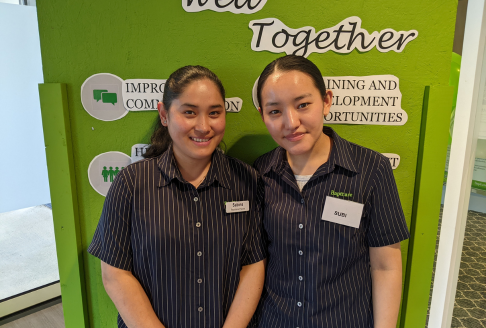
We are the Champions
Before they started working at Baptcare, Subi and Sabina had never met.They have the same last name, Gurung. They were born in the same country, Nepal. They have entered the same profession, nursing.Now they are not only friends, but the first two Baptcare Living Well Together Champions.Subi started at Baptcare in March 2021, and works at our Brookview Aged Care community. “Living Well Together Project is a holistic approach, working alongside residents to support them to live meaningful lives,” she says.“I am grateful to Baptcare for providing me with an opportunity to be one of the Champions of Living Well Together.“Being a Champion comes with responsibilities of coaching and mentoring staff members about Living Well Together. My role is also to support staff to provide quality person-centred care that supports each resident's choice, identity, independence, lifestyle and abilities. We attend training and spread that education to other staff members to implement this new project.”Sabina joined Baptcare two years ago and is our Living Well Together Champion at Baptcare Strathalan Aged Care community.“I am keen to know new things, and that’s why I agreed to be a Champion,” Sabina says. “The thing that fascinates me about Living Well Together is the approach it takes to providing person-centred care.“To make it successful we will need support from the multi-disciplinary teams. This is evidence-based practice that we need to implement in the best way possible.”The Living Well Together approach will help Baptcare meet the needs of all residents we care for, including those living with cognitive impairment or dementia. The project is being delivered in partnership with a team from Monash University’s Health and Social Care Unit, and is co-designed with our residents and staff.Subi on Sabina: “Sabina is friendly and easy to approach. I was glad to meet Sabina since we have the same kind of passion towards our work. We are both passionate to learn about Living Well Together.”Sabina on Subi: “It was a pleasure meeting Subi. She has helped me with lots of information regarding the Living Well Together project. She is very friendly and very comfortable to work with.”
- 11 Aug 2023
-
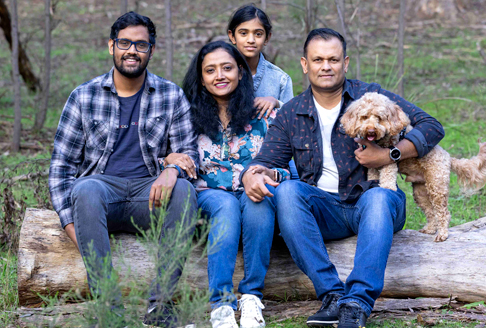
Faces Of Baptcare #50 | Meet Nilu Morawaka
It’s lucky for Baptcare that the world of high finance was not Nilu’s real calling. A much respected and loved member of the Baptcare community, Nilu makes a positive impact in all that she does, and it seems this has always been the case. “I have been fortunate to work with Nilu twice in my career now. Both times I have worked alongside Nilu when we were involved in some high stakes/crisis situations and she is always a measured and calm leader! I also admire her genuine drive to support her staff, our residents and their families. We are very fortunate that Nilu is part of the Baptcare team,” said Jacinta Duffy, Executive General Manager, Communications and Customer Experience.Angela Tupaz, Operations Manager, Residential Aged Care supports this view. “Nilu is a gentle yet effective leader. She has a positive outlook and it reflects on how she leads her team. Nilu empowers her team which makes it a pleasure to work with her.”And the praise just keeps coming, with Belinda Wood, Quality Manager at Baptcare commenting that Nilu is “thoughtful and collaborative in her approach, with a quiet sense of humour and a wonderful smile.”You can read more about the incredible Nilu below.In light of our recent celebrations of Aged Care Employee Day, can we start by asking what it means to you?Aged care employees are very special. They work tirelessly to provide essential care to support our older citizens. This is a good opportunity to acknowledge their hard work, boost their morale and strengthen relationships. What is your current role and what does it involve day to day?I am on secondment as the Divisional Manager for Residential Services and Operations until December 23, 2023. My day-to-day involvements are to support our leaders to ensure we deliver the best care and services to our residents, provide coaching and mentoring to Residential Aged Care (RAC) leadership teams, lots of meetings, planning and reporting, and overall, assist our teams in achieving our organisational strategic goals.How long have you been working within your current team at Baptcare?I joined Baptcare on the 17th of February 2022. The best decision that I ever made.What do you like about working at Baptcare/in your area?I feel psychologically safe at Baptcare. I feel comfortable, supported and confident in expressing myself without fear of negative impact. Baptcare is like my second family. Everyone is so kind, caring and supportive. We spend most of our time at work, and it is essential to be happy at work.If you had a magic wand and could change one thing within the aged care space, what would it be?Create a more compassionate and equitable society where our seniors can age with dignity and peace of mind. Then we can remove the red tape and have more fun in aged care.Did you always want to work within the caring space, and what are some other jobs you’ve performed in your career?I worked in one of the top banks in Sri Lanka but when I migrated to Australia in 2002, I wanted to pursue nursing. So, I did my Bachelor of Nursing and then a Master of Health Administration. What did you want to be when you grew up?In Sri Lanka, it is not about what you want to be. It is what your parents want you to be. It usually is a doctor or an engineer. I did science subjects but couldn’t get into medical college. Banking is also a reputed job there, and then I became a banker.Your career change from banking to nursing is very interesting. What made you/inspired you to pursue a nursing career? (ed. I’m thinking that nursing and finance are polar opposites in life!) When I came to Australia, it was a good opportunity to rethink what I wanted to do and what career would give me the most job satisfaction. After careful consideration, I decided to join the health sector and loved every bit of it and learned so much. I worked at the Austin Hospital, The Northpark Private Hospital and some afterhours supervisor roles in aged care. When I decided to work full-time in aged care, my theatre nurse friends said I was wasting my knowledge. They didn’t understand that aged care is a specialty and you need to be more skilled to be in aged care. How many years did you practice as a nurse before going into the nursing administration side of things?I was in clinical roles for seven years before I became a Residential Care and Services Manager. How has your previous banking career helped you in your current job?Having a financial background when you work in leadership is beneficial. Most nurse managers tend to focus on clinical outcomes and not financial sustainability. It is so important to have that balance. Can you tell us 2 surprising things about yourself? I have a 23-year-old son and a 12-year-old daughter.What is the last book or TV series you watched? I am currently reading a book gifted to me called ‘Mindfulness, Bliss, and Beyond’ by Ajahn Brahm. I don’t watch TV series because I can’t keep up with the episodes. My favourite channel is the Food Channel, but my cooking skills are limited.What does an ideal weekend involve for you? Or What do you do to relax/unwind?I love to spend my weekend hiking, bike riding or gardening. When the weather is not ideal for these things, I like shopping.What are some of the best hikes you’ve done?I am not a professional hiker, but I love it! I have done a few hikes, including Yellow Gum Circuit, Blue Lake Circuit, Plenty River Loop, and others in Plenty George, Belmore Falls and Grampians National Park. What hikes are on your ‘bucket- list’? (ed: I did the Three Capes hike in Tasmania a few years ago – just heavenly!)I googled Three Capes hike, and it looks stunning. It is now definitely on my bucket list!Do you have a favourite quote or motto in life?The only way to do great work is to love what you do – Steve Jobs.How would your friends describe you?Funny, caring and easy-going.Do you have a mentor or idol? OR if you could sit next to someone at a dinner party, who would it be and why?I admire Michelle Obama for her inspiring leadership, resilience and determination. She is also known for her passionate advocacy, particularly in youth empowerment, healthy living and education. She is also a skilled communicator with high emotional intelligence to connect with her audience.Do you want to be part of Baptcare’s outstanding workforce? Read more here!
- 10 Aug 2023
-
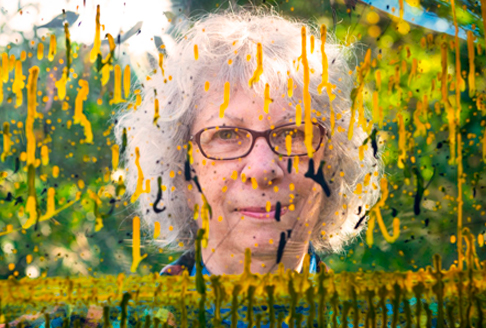
Meet Carol Gardner
We say it often and we mean it always: our Baptcare community – staff and customers – is endlessly dynamic and fascinating. Our Faces of Baptcare series enjoys showcasing these vibrant individuals, such as Home Care client: Carol Gardner.
- 03 Aug 2023
-
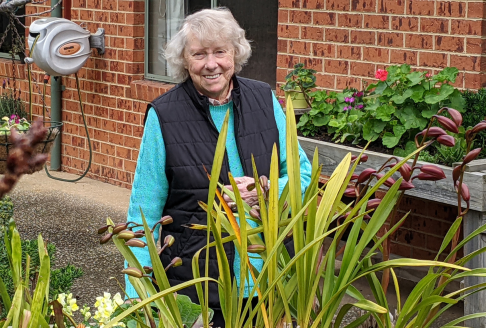
A life in full bloom: gardening with Ailsa at Peninsula View
Ailsa Fraser has only been part of the Baptcare Peninsula View aged care community for eight months, but her impact is obvious. Despite the winter weather, Peninsula View’s beautiful central garden is flourishing, thanks to her hard work (and very green thumbs!)
- 01 Aug 2023
-
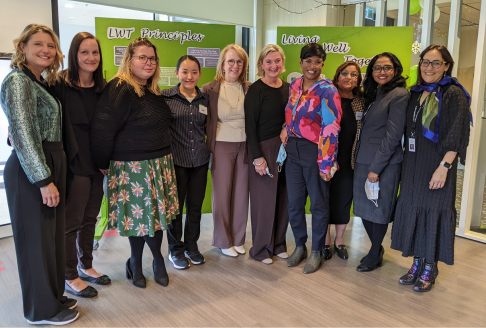
Living Well Together launched at Baptcare Brookview
Living Well Together, our new model of care for Baptcare’s Residential Aged Care homes, was officially launched this week.It will help us meet the needs of all residents we care for, including those living with cognitive impairment or dementia.The launch was held at Baptcare’s Brookview Residential Aged Care community, the pilot site for Living Well Together.Baptcare is partnering with a team from Monash University’s Health and Social Care Unit to implement Living Well Together, co-designed with our residents and staff.“Brookview staff have embraced this model of care,” said Susan Lyon, Living Well Together Program Manager. “Our frontline staff are the best resource we have. This project is about promoting identity, independence and working alongside – doing with our residents, not for them.”Living Well Together focuses on what matters to residents, what is important to them, and what gives them meaning and purpose. The model of care will support staff to work alongside residents and to support them to live their fullest lives.Associate Professor Darshini Ayton from Monash University said, “What we are building is based on the best practice evidence available, but we had to make it applicable to residents, staff and families.“This is a whole-of-home project. It is not for a specific wing, or for people with specific characteristics. It is for all residents and all staff: one consistent way of working, caring, being.“The model isn’t static. We are continuing to grow and develop it. But it is based around a Montessori approach, focusing on person-centred care, environment, integration and coordination, clinical care, and workforce and training.”The project commenced in 2021 when Monash University researchers conducted a review of the literature on person-centred interventions, what best practice looks like in a residential aged care setting, and the training needs of staff.It is exciting to have the project underway at Brookview. Baptcare’s Strathalan Residential Aged Care community will be the next trial site.
- 27 Jul 2023
-
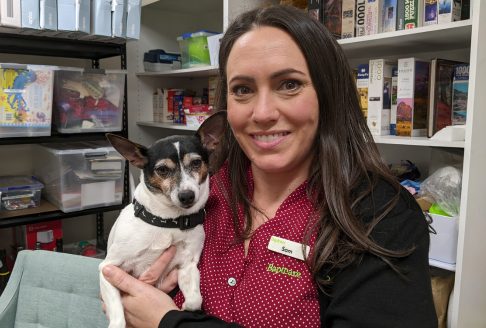
Sam makes every role a winner
Great people make a contribution whatever their role in an organisation.Sam Horde is currently Volunteer and Lifestyle Coordinator at Baptcare’s Peninsula View aged care community. She has been with Baptcare since 2010, but hasn’t been pigeon-holed in any one position.“I was recruited to work in Accounts Payable,” Sam says. “From there I moved to different roles in Facilities & Supply, before I applied for the role of Executive Assistant to the General Manager of Aged Care and Family & Community Services.“It was great being at central office, seeing the way the organisation worked and all the ways the different parts of Baptcare operated together.”She took time away to give birth to her second daughter, but her skills were not forgotten. “They asked me if I would like to come back and offered me a role at Peninsula View, and it’s great to be here.“The best part of my job is fulfilling residents’ lives. Making them smile means a lot, but so does providing reassurance to families that their loved ones are being cared for.”As she pats Peninsula View’s beloved therapy dog BooBoo, Sam lists some of the lifestyle activities she oversees: balloon volleyball, carpet bowls, Happy Hour, arts and crafts, men’s group, gardening, chair exercise, Zumba, concerts, therapy animals – and of course bingo.Originally a hairdresser, Sam worked in insurance during the 18 years she lived in the United States. She has convinced her American husband that the Peninsula lifestyle is even better than San Francisco, which is good news for Baptcare.“I love it here,” she says. “My manager is approachable, we are a great team, and everyone cares.“It has been super-easy and fully supported for me to change roles within the organisation. I have now almost finished my Certificate IV in Leisure and Health, and who knows where my Baptcare career will go next.”“Sam is really dedicated, and she has built a great team,” says Peninsula View Residential Care & Services Manager Adam Jochim. “She is always doing early research into dementia and other issues and presenting ideas about better ways we can work. Everything she does is for the betterment of our residents.”Do you want to be part of Baptcare’s outstanding workforce? Read more here!
- 25 Jul 2023
-
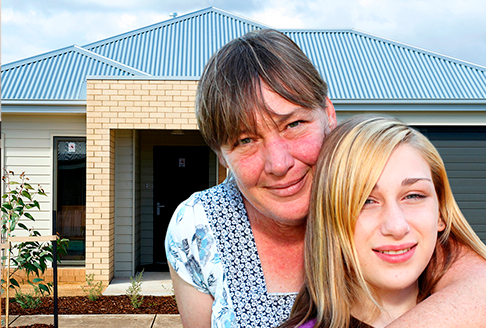
Social versus affordable housing – an explainer
What is the difference between ‘social’ and ‘affordable’ housing?Many people use these terms interchangeably – but they are two different things.Social housing refers to government-subsidised short- and long-term rentals. Two types of social housing are ‘public housing’ which is owned by the government and ‘community housing’ which is managed and sometimes owned by not-for-profit organisations. Social housing rents are calculated based on income – typically 30 percent of a renter’s income – and target people on lower incomes or benefits.On the other hand, affordable housing refers to housing options which are available at a rent or price lower than the local market rate. Affordable housing is considered to be accessible for those on low or moderate incomes. Rents are based on market rates – typically 25 percent less than what the market is charging for similar housing.Ten years ago, Baptcare launched a subsidiary, Baptcare Affordable Housing (BAH), providing well-located and well-built social housing for people on lower incomes who are at risk of, or are experiencing, homelessness.To read more about our affordable housing projects, click the link below:https://www.baptcare.org.au/services/housing/affordable-housing
- 24 Jul 2023
-

From the laundry to the front office
Adam Jochim, Residential Care & Services Manager at Baptcare Peninsula View residential aged care community, is not usually short of words. However, when asked to describe the impact of office manager Suzanne Lewry, he takes a moment.“Suzanne is just wonderful,” he says eventually. “She is open, understanding and a pillar of support.“The other thing is that she is so incredibly fast to get her head around any changes to procedure, computer programs or staff. We are lucky to have her.”Suzanne’s connection with Peninsula View goes back to a time before it was a Baptcare community. She started working at the facility in 2008, and stayed on when Baptcare took over in 2013.“My background had been in admin but I was out of the workforce until the youngest of my three kids commenced school,” Suzanne remembers.“I wanted a job, and a position was going here as a casual cleaner. I then became a laundry assistant for a couple of years, moved into lifestyle team then worked as Laundry Manager, and then when an opportunity came to return to administration, I jumped at that.“As office manager I oversee all admin tasks including rostering, recruitment, looking after new starters and overseeing visiting.“I think it’s important to know what everyone has to do in their role, and what the challenges are. Having worked in so many different roles I know what it’s like for my colleagues, and that understanding really helps.”Suzanne was born and raised in the area and loves working with the older people of the Peninsula. When she is away from work she is relishing her new role as a grandmother to one grandchild (with another on the way soon).“I feel a strong attachment to all of our residents. Their faces light up when they see you.“I look around Peninsula View and see my colleagues making an important difference in people’s lives. It makes me proud to be working with Baptcare.”
- 20 Jul 2023
-
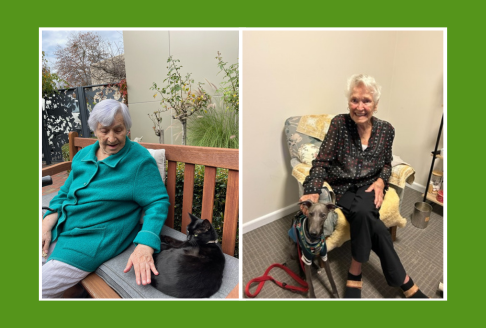
The benefits of pet therapy in aged care settings
Those of us with a love for pets know all too well the joy they bring into our lives. Benefits include improved physical, emotional and social well-being as we connect and bond with our pets, take care of their needs and receive their unconditional love in return.People moving into an aged care community may not always have the ability to look after their own pet on site. They can, however, still look forward to interacting with pets through visiting programs or animal assisted therapy sessions.At many of our aged communities, Baptcare is pleased to offer both formal therapy sessions and more informal pet visits. Our Karana community, in Kew, has a resident cat, Miss Mona, along with visits from Morris, the pet therapy dog and an assortment of dogs living with our residents’ families who pop in for a visit each Thursday.Ann Marie Harli, Lifestyle Coordinator at Karana, has seen first-hand the benefits experienced by residents interacting with pets. “The feedback has been amazing,” says Ann Marie. “The comments from our residents about Miss Mona the cat shows how much joy and connection she brings to their lives.”Here’s just a few of the many adoring comment on Miss Mona from our Karana community:“I pat her and she is lovely, she’s so soft and doesn’t hurt anyone.”“I like trying to read her mind when she is telling you something.”“I really enjoy seeing the residents when she jumps on their trolleys and sits there for a ride.”“I love the way she comes into activities to be part of the group.”“Seeing a cat asleep on a chair feels like home.”Says Ann Marie, “I have a great deal of faith in the pet therapy program here at Karana and would like to encourage others to consider this type of program, too.”What is animal assisted therapy?Animal assisted therapy, or pet therapy, is a guided treatment session designed to support individual health goals – physical, mental and social. Animal assisted therapy is not just limited to supporting people in aged care. It can have broader applications, including emotional and behavioural problems in children, addiction and autism to name just a few.Research shows that animal assisted therapy can improve the physical and emotional health of older people living in aged care communities. Benefits for residents include:Reduced loneliness and isolation: through providing companionship and unconditional love.Reduced stress and anxiety: connecting with pets can be a calming experience, providing a distraction from negative thoughts and feelings.Increased physical activity: pet therapy can encourage people to get up and move around to better interact with their chosen animal.Improved cognitive function: being around animals can stimulate people’s minds about their experiences owning pets, assisting with memory recall.Enhanced social interaction: when pet therapy is done in a group context, it can help bring people together and encourage them to interact with one another.Specific benefits for elderly people living with dementiaIn addition to these general benefits which can be enjoyed by aged care residents, elderly people living with dementia can enjoy specific effects. These include:Reduced agitation and aggression: petting an animal can be quite soothing, allowing someone with dementia to feel comforted by the experience, reducing tension.Improved communication: animals can help stimulate memories and conversation – or even just smiling, laughing and eye contact for those who have lost the ability to speak.Enhanced memory and recall: interacting with animals can help trigger memories and associations for people experiencing memory loss.Increased motivation and engagement: regular pet therapy sessions can give people something to look forward to and help them stay involved in their surroundings.Who benefits most from animal assisted therapy – and who might notAnimal assisted therapy is best targeted at those who enjoy positive memories with animals and pets. It is not suited to those with animal allergies or for those with immune issues unless strict infection control procedures are in place.Pet therapy is a wonderful way to improve the quality of life for elderly people in aged care. When properly targeted, it can be a valuable tool to help make aged care residents feel more at home and relaxed.Baptcare is delighted to provide our aged care residents with guided pet visits through our vibrant lifestyle programs. These programs are designed to create stimulating activities and experiences tailored to our residents’ needs, cultural backgrounds and abilities. To learn more about our residential aged care communities click here.
- 17 Jul 2023
